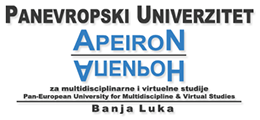 Self-Rated Health Among Students of Health Sciences In Bosnia and Herzegovina
Self-Rated Health Among Students of Health Sciences In Bosnia and Herzegovina
Self-Rated Health Among Students of Health Sciences In Bosnia and Herzegovina
Slađana Šiljak, Ljiljana Stojanović-Bjelić, Dragana Nešković Markić
Pan European University Apeiron, Banja Luka, Bosnia and Herzegovina
sladjanaps@gmail.com
ABSTRACT: Self-rated health is associated with health behaviour and socio-demographic and socio-economic conditions on the way that health risks and poor socio-economic status determine poor self-rated health. The aim of the study was to determine self-rated health among students, perceive health behaviour risk and association with sociodemographic and socio-economic characteristics of students. Methods: Study is conducted as a cross-sectional study among students of health sciences in autumn semester 2022. Year. Specially designed questionnaire was constructed based on international guidelines. Anonymously filling out an on line formed questionnaire by voluntary singing on university web site. Results: More than three quarter of students perceived their health as a good and no one perceived health as a poor. Most students perceived their health as good (83,2%), mainly students with a technical background and those who are living in good socio-economic conditions (89,0%) (p<0,05). The most frequent health risks among students are lack of physical activity (44,5%) and less than six hours for sleep and rest (43,8%). More than a third of students perceived fear, nervousness and tension (34,3%), a lack of time for friendship and family (33,6%) and irregular diet (31,4%). Every seventh student perceived overweight and obesity. Students who are living in poor socio-economic conditions perceived more health risks as well as those who don’t have medical background and who are employed. More students in urban area perceived mental problems than those in rural areas. Conclusion: Students are mainly perceived their health as a good and have health risks which will be reduced through health promotion in university educational programmes.
Keywords: perception of health, self-rated health status, risk behaviours, students
| Attachment | Size |
|---|---|
| VOL14-Iss3-4_4.pdf | 395.09 KB |
